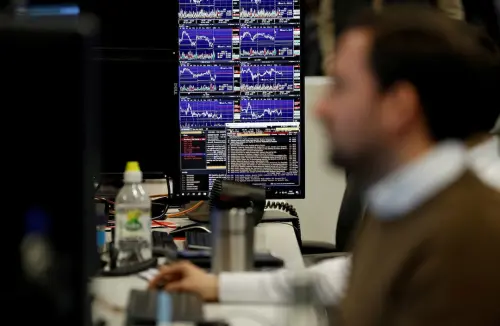Europe's primary stock markets and currencies experienced a surge on Thursday, buoyed by growing optimism surrounding a peace agreement between Ukraine and Russia. Bond markets recovered from initial hesitations triggered by elevated U.S. inflation data.
Persistent concerns regarding trade wars maintained demand for gold, with the U.S. reaffirming intentions to impose tariffs on countries with duties on American goods.
The euro strengthened by 0.3% to $1.041 following talks between Russian President Vladimir Putin and Ukrainian President Volodymyr Zelenskiy, fostering hopes for an end to the longstanding conflict.
Oil prices declined for a second consecutive day, while Europe's STOXX 600 reached a record high with a year-to-date surge of 8%. However, Wall Street's S&P 500 and Nasdaq futures showed losses.
Currency strategist Chris Turner from ING mentioned that a peace deal in Ukraine could bring about positive outcomes for European nations, potentially resulting in lower energy prices and a rebuilding effort akin to a Marshall Plan.
Moreover, the Swiss franc and the British pound also strengthened, with the latter benefitting from data indicating a slight uptick in economic activity at the end of the previous year.
Asian markets performed well, with Japan's Nikkei rising by 1.3% due to a weaker yen, while the broader Asia-Pacific shares outside Japan reached a high not seen since early December.
Amidst ongoing shifts in the bond market following high U.S. inflation figures, expectations for additional Federal Reserve policy easing decreased, with a reduction of only 28 basis points anticipated for the year.
As bond yields fluctuated, Germany's ECB rate setter Joachim Nagel reiterated the need for rate adjustments, contrasting with Barclays analysts who predicted at most a single rate cut from the Fed in the upcoming year.
In Ukraine, government bond prices climbed amidst hopes for peace talks, although there were concerns that an imposed deal might prompt further Russian aggression. Former Russian President critiqued Europe's response to the situation, signaling potential rifts in their global standing.
The dollar weakened against the yen, and oil prices continued their decline, reflecting expectations of improved supply flows due to potential easing of Russian oil sanctions following peace talk prospects.
